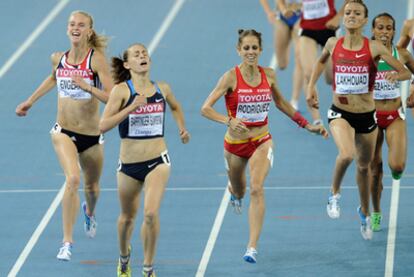Rodríguez gets Spain off the mark
Runner takes 1,500m bronze as team faces up to mediocre showing in Daegu
José Marín, something of a sophist, answers the question with another question: "How is it possible that we did so well on previous occasions? We didn't enjoy the medals because we thought it was normal and that they would always criticize us. We'd come back with half a dozen of them and they'd say it made up for the failure of many athletes. We thought that was just the way it was... but it's not anymore," says the race walker, European champion in 1982 and a world bronze medalist in 1987.
With more than half of the World Championships in Daegu completed, Spain's track & field team has been largely absent from the two classifications used as gauges of performance: the medals table and the list of finalists. Of a field of 44 athletes, just Natalia Rodríguez, who went some way to sparing Spain's blushes with a bronze-medal showing in the 1,500m, and Manuel Olmedo, who qualified for the final in the same event on Friday with a fourth-placed finish in 3.36:91, have achieved a place on either.
"I was obsessed with winning the gold medal, but a bronze medal here gives me a lot of hope for next year [in London]. As now, I will aspire to the gold there. If in the end it's a different medal, then fine, but you have to aim for the maximum," said Rodríguez after Thursday's race, won by US runner Jennifer Simpson, with the UK's Hannah England taking silver.
"You have to bear in mind that the qualification bar has been set very high," says Marín. "Many athletes have given their all to reach theirs. It is very difficult for an athlete who has struggled to qualify to succeed, aside from the fact that he or she will arrive slightly out of form. But that's the way the system is."
In none of the previous 12 World Championships has Spain finished without a medal. Olmedo may add some gloss to the tally in the 1,500m final - the key event in this year's tournament from a Spanish viewpoint - but many of the medal hopes were eliminated at the first hurdle on Friday: Ruth Beitia in the high jump; Felipe Cáceres and Luis Felipe Méliz in the long jump; Mercedes Chilla in the javelin; Borja Vivas in the shot-put and Javier Alves in the 5,000m. On a brighter note, Jesús España qualified for the 5,000m final.
On Thursday, even the 20km march, usually ripe ground for a Spanish medal, failed to halt the tendency. Neither in the men's nor the women's field did Spain make an impact. Olga Kaniskina, undefeated in top competition since 2007, took gold; her third consecutive world title. The Russian also won Olympic gold in Beijing and took the European title in Barcelona. The highest-placed Spaniard was Beatriz Pascual, ninth, a position she was far from happy with. María Vasco, the great unwavering veteran, was 13th and María José Poves was disqualified.
Certain voices talk of a lack of fight in the Spain team, a lack of competitive spirit, of a conviction that what was important was to qualify for the championships, not compete in them. Pascual, evidently by her reaction, is not one of this group. "My performance was bad," said the Catalan, sixth in Beijing and fifth in Barcelona. "I didn't train to be ninth. I came to finish in the top five. but maybe I overestimated myself."
"The winners here are not more professional or better competitors than ours," says Marín, who is Pascual's coach and technical director of the race walk team. "We have plenty of fighting spirit."
"I thought I was going well but, when I received two technical warnings, I was surprised and lost concentration," said Pascual, 29. "I decided to ease off a little so they wouldn't disqualify me and to try to finish in the top eight. But in the end it was neither one thing nor the other."
Vasco suffered a blackout at the 15-km mark, crossing the line unsure if she had finished or not and vomiting in the infirmary. The 35-year-old had not prepared specifically for Daegu, with her eye firmly set on London. "My fifth Olympics will be a different story," said the only Spaniard to win a medal in the event at the Games, bronze in Sydney in 2000.

Tu suscripción se está usando en otro dispositivo
¿Quieres añadir otro usuario a tu suscripción?
Si continúas leyendo en este dispositivo, no se podrá leer en el otro.
FlechaTu suscripción se está usando en otro dispositivo y solo puedes acceder a EL PAÍS desde un dispositivo a la vez.
Si quieres compartir tu cuenta, cambia tu suscripción a la modalidad Premium, así podrás añadir otro usuario. Cada uno accederá con su propia cuenta de email, lo que os permitirá personalizar vuestra experiencia en EL PAÍS.
¿Tienes una suscripción de empresa? Accede aquí para contratar más cuentas.
En el caso de no saber quién está usando tu cuenta, te recomendamos cambiar tu contraseña aquí.
Si decides continuar compartiendo tu cuenta, este mensaje se mostrará en tu dispositivo y en el de la otra persona que está usando tu cuenta de forma indefinida, afectando a tu experiencia de lectura. Puedes consultar aquí los términos y condiciones de la suscripción digital.








































